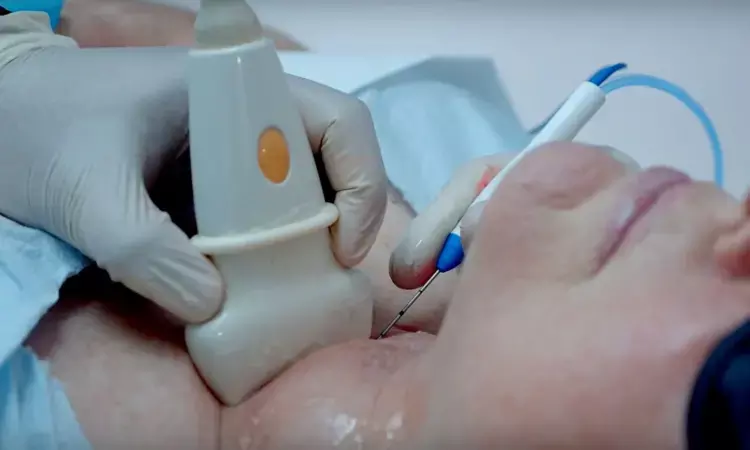- Home
- Medical news & Guidelines
- Anesthesiology
- Cardiology and CTVS
- Critical Care
- Dentistry
- Dermatology
- Diabetes and Endocrinology
- ENT
- Gastroenterology
- Medicine
- Nephrology
- Neurology
- Obstretics-Gynaecology
- Oncology
- Ophthalmology
- Orthopaedics
- Pediatrics-Neonatology
- Psychiatry
- Pulmonology
- Radiology
- Surgery
- Urology
- Laboratory Medicine
- Diet
- Nursing
- Paramedical
- Physiotherapy
- Health news
- Fact Check
- Bone Health Fact Check
- Brain Health Fact Check
- Cancer Related Fact Check
- Child Care Fact Check
- Dental and oral health fact check
- Diabetes and metabolic health fact check
- Diet and Nutrition Fact Check
- Eye and ENT Care Fact Check
- Fitness fact check
- Gut health fact check
- Heart health fact check
- Kidney health fact check
- Medical education fact check
- Men's health fact check
- Respiratory fact check
- Skin and hair care fact check
- Vaccine and Immunization fact check
- Women's health fact check
- AYUSH
- State News
- Andaman and Nicobar Islands
- Andhra Pradesh
- Arunachal Pradesh
- Assam
- Bihar
- Chandigarh
- Chattisgarh
- Dadra and Nagar Haveli
- Daman and Diu
- Delhi
- Goa
- Gujarat
- Haryana
- Himachal Pradesh
- Jammu & Kashmir
- Jharkhand
- Karnataka
- Kerala
- Ladakh
- Lakshadweep
- Madhya Pradesh
- Maharashtra
- Manipur
- Meghalaya
- Mizoram
- Nagaland
- Odisha
- Puducherry
- Punjab
- Rajasthan
- Sikkim
- Tamil Nadu
- Telangana
- Tripura
- Uttar Pradesh
- Uttrakhand
- West Bengal
- Medical Education
- Industry
Study Highlights Impact of Pre-operative Thyroglobulin Levels on Thyroid Cancer Risk and Treatment Outcomes

USA: Thyroid cancer, a relatively common malignancy affecting the thyroid gland, poses challenges due to its potential for recurrence even after treatment. Recent studies highlight the critical role of pre-operative thyroglobulin (Tg) measurements in predicting both the risk of recurrence and the therapy's effectiveness among patients.
In a retrospective analysis in The American Journal of Surgery examining 162 thyroid cancer patients undergoing surgery, researchers revealed a significant association between higher pre-operative Tg levels & increased odds of high-risk disease, corresponding with larger tumor sizes & high-risk histology.
The lower the pre-operative Tg, the more likely the patient will experience an excellent response to therapy following initial surgical management.
"Elevated Tg levels were associated with less favorable responses to initial surgical treatment, indicating its potential usefulness in guiding both initial treatment decisions and subsequent follow-up strategies," the researchers wrote.
Thyroid cancer generally carries a positive prognosis, yet no pre-operative biochemical marker has demonstrated the ability to differentiate between low and high-risk diseases or reliably predict response to treatment.
Thyroglobulin, a protein produced by thyroid cells, is a valuable biomarker in monitoring thyroid cancer. Elevated levels of Tg before surgery can indicate the presence of residual thyroid tissue or metastasis, guiding clinicians in planning appropriate treatment strategies post-surgery. This measurement is particularly significant for patients undergoing thyroidectomy, where accurate assessment of Tg levels helps predict the likelihood of cancer recurrence.
Against the above background, Martin Jose Barrio, University of Colorado School of Medicine, Aurora, CO, United States, and colleagues retrospectively reviewed patients at our institution with a diagnosis of differentiated thyroid cancer (DTC) to determine the correlation between pre-operative Tg levels with ATA structural risk of recurrence based on surgical histopathology and response to therapy following initial therapy.
They retrospectively reviewed 162 patients who underwent thyroid surgery for thyroid cancer between 2006-2022, in whom a pre-operative thyroglobulin level was measured.
Patients were subdivided into low, intermediate, and high-risk thyroid cancer, and based on their response to therapy per American Thyroid Association (ATA) guidelines.
The following were the key findings of the study:
· As pre-operative Tg level increased, patients were more likely to have high-risk disease.
· There was a linear association between the primary tumor size and high-risk histology with pre-operative Tg.
· Pre-operative Tg level was significantly associated with response to therapy following initial surgical management.
· As pre-operative Tg increases, patients are less likely to achieve an excellent response.
In conclusion, the findings showed that pre-operative thyroglobulin levels had a significant correlation with the ATA's structural risk of recurrence and response to therapy, suggesting potential utility in directing initial treatment and subsequent follow-up care.
Reference:
Barrio, M. J., Pozdeyev, N., Raeburn, C. D., McIntyre, R. C., Marshall, C. B., Haugen, B., & La Greca, A. (2024). Pre-operative Thyroglobulin Measurement for Thyroid Cancer Risk of Recurrence and Response to Therapy. The American Journal of Surgery, 115818. https://doi.org/10.1016/j.amjsurg.2024.115818
Dr Kamal Kant Kohli-MBBS, DTCD- a chest specialist with more than 30 years of practice and a flair for writing clinical articles, Dr Kamal Kant Kohli joined Medical Dialogues as a Chief Editor of Medical News. Besides writing articles, as an editor, he proofreads and verifies all the medical content published on Medical Dialogues including those coming from journals, studies,medical conferences,guidelines etc. Email: drkohli@medicaldialogues.in. Contact no. 011-43720751


